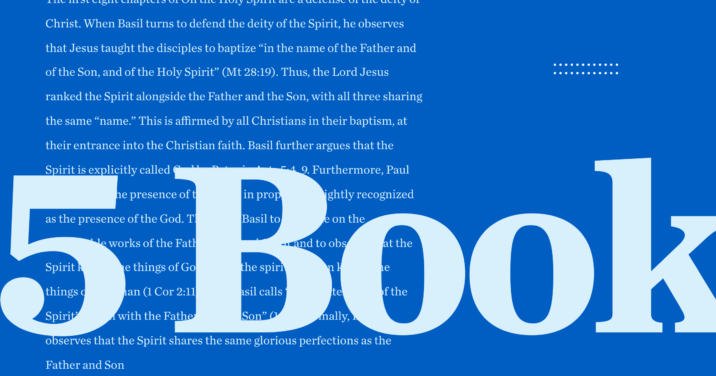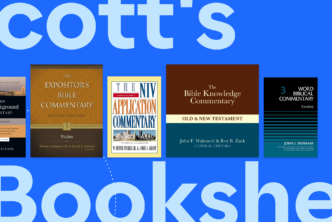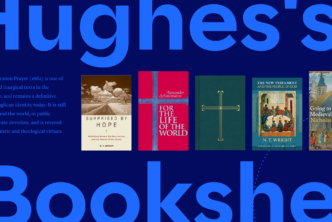An immense list of the best books on the Holy Spirit could easily be overwhelming. So start here! Your study of the Spirit through these selections will be time well spent.
Table of contents
- 1. St Basil the Great, On the Holy Spirit
- 2. John Owen, Πνευματολγια [Pneumatologia] or, A Discourse Concerning the Holy Spirit
- 3. Sinclair B. Ferguson, The Holy Spirit
- 4. Gordon D. Fee, God’s Empowering Presence: The Holy Spirit in the Letters of Paul
- 5. Wayne Grudem, ed., Are Miraculous Gifts for Today: Four Views
- For further reading on the Holy Spirit
1. St Basil the Great, On the Holy Spirit
Basil of Caesarea’s book on the Holy Spirit, written in the fourth century, is the first book dedicated to the person of the Spirit. The book identifies itself as written to Amphilochius, bishop of Iconium, by Basil, archbishop of Caesarea. However, Basil also seems to have had in mind persuading those who, though they affirmed the deity of the Son, denied the deity of the Holy Spirit. One of these men was a former mentor of the young Basil. This man didn’t say that the Holy Spirit was created; but he wouldn’t call the Spirit God either. He said the Spirit was given by God to Christians to enable them to walk worthy of their calling.
The first eight chapters of On the Holy Spirit are a defense of the deity of Christ. When Basil turns to defend the deity of the Spirit, he observes that Jesus taught the disciples to baptize “in the name of the Father and of the Son, and of the Holy Spirit” (Matt 28:19). Thus, the Lord Jesus ranked the Spirit alongside the Father and the Son, with all three sharing the same “name.” This is affirmed by all Christians in their baptism, which is their entrance into the Christian faith. Basil further argues that the Spirit is explicitly called God by Peter in Acts 5:4, 9. Furthermore, Paul implies that the presence of the Spirit in prophecy is rightly recognized as the presence of the God. This leads Basil to meditate on the inseparable works of the Father, Son, and Spirit and to observe that the Spirit knows the things of God just as the spirit of a man knows the things of that man (1 Cor 2:11). This Basil calls “the greatest sign of the Spirit’s union with the Father and the Son” (16.40). Finally, Basil observes that the Spirit shares the same glorious perfections as the Father and Son
Basil’s On the Holy Spirit likely had a significant influence on the statement regarding the Holy Spirit in the Nicene Creed of 381. Yet, influential as it is, this is a brief and comprehensible book.
2. John Owen, Πνευματολγια [Pneumatologia] or, A Discourse Concerning the Holy Spirit
John Owen’s Discourse Concerning the Holy Spirit is one of the most significant historical works on the Holy Spirit. Often, Owen actually repeats arguments first laid down by Basil. For instance, Owen too argues that Jesus’ instructions regarding baptism in Matthew 28:19 are foundational for the Christian affirmation of the Spirit’s deity (3:72). And yet at over six hundred pages in the Goold edition, Owen develops his insights on the Spirit at greater length than Basil. Owen also covers topics beyond the deity of the Spirit. Though he begins with a study of the names and titles for the Spirit that leads him into a defense of the Spirit’s deity, Owen moves on to survey the work of the Spirit in the Old Testament, in the person of Christ, and in the Christian. He develops Spirit’s role in regeneration and sanctification extensively.
Owen has a reputation for being a daunting read. However, he is worth the effort. Try reading him out loud. Let the sentences flow so that you gain an overall sense of what he is saying. Then consider reading back through a section, tracing the argument by highlighting with different colors the levels in the outline of Owen’s argument. Puritans loved outlines with subpoints upon subpoints, and tracing these can help the reader gain a better understanding of the argument in its broad strokes.
A new edition of Owen’s works is currently being released by Crossway. These editions update the typography and spelling of the older editions while also translating portions in languages other than English and providing footnotes regarding English words that have become obscure since Owen’s time. These volumes also contain extensive editors’ introductions. Though A Discourse on the Holy Spirit has not yet appeared in this series, volume 8 has been recently released, and it consists of three of Owen’s shorter works on the Spirit: The Work of the Holy Spirit in Prayer, The Holy Spirit as a Comforter, and A Discourse of Spiritual Gifts.
Your books are better in Logos. Learn how Logos helps you read, understand, and draw connections across Scripture.
3. Sinclair B. Ferguson, The Holy Spirit
Sinclair Ferguson’s The Holy Spirit is essential reading for every student of theology. It not only brings the theology of John Owen and Geerhardus Vos to a modern audience, but it models how theology should be done.
Ferguson begins by surveying the Old Testament’s teaching about the Holy Spirit. By careful attention to exegetical details, Ferguson demonstrates that the Spirit is already at work “to order and complete what has been planned in the mind of God” (21). He does this by his involvement in creation, by equipping leaders to move forward God’s plan of redemptive history, and by his work of regenerating and sanctifying believers.
Ferguson turns to the Spirit’s role in the life and ministry of Christ—from his work in the incarnation and virgin conception of Christ, his anointing of Christ at his baptism, and his role in raising Christ from the dead. Ferguson’s insights in these discussions is remarkable. For instance, he notes that the imagery of the dove at Christ’s baptism recalls the Spirt hovering like a bird at creation and the dove sent out by Noah after the Flood; it is an image that in Christ the new creation is beginning.
After Christ ascended to heaven, he sent the Spirit as a “Paraclete” (John 14:16, 26; 15:26; 16:7; cf. 1 John 2:1), which Ferguson interprets as a witness who testifies to the character of someone on trial. Ferguson also examines texts that teach that the indwelling of the Spirit involves the indwelling of Christ in the believer. The relation of the Spirit and the Son raises the issue of the filioque. Does the Spirit proceed from the Father alone or from the Father and the Son? Ferguson argues for the latter and thus for the acceptance of the filioque clause in the creed.
Ferguson’s study of the Spirit in Acts is superb. He recognizes that Pentecost specifically and Acts in general stand at a redemptive–historical turning point as the people of God move from the old covenant to the new covenant. Thus, careful attention must be given to what is specific to this transition and what is normal for current Christian experience. This leads to a discussion of the order of salvation and of union with Christ.
Ferguson argues that instead of seeing the benefits of salvation unfold in a causal chain, it is better to see them all flow from union with Christ, a union effected by the Spirit. On this model the believer cannot think of the benefits of salvation apart from Christ. Furthermore, this model avoids the danger of a believer being more focused on where he is in the chain of the order of salvation than of his relationship with Christ. None of this is to say that Ferguson neglects the Spirit’s role in the individual benefits of salvation. He discusses at length the Spirit’s role in regeneration and in providing the gifts of faith and repentance, for instance.
Toward the close of the book, Ferguson addresses the issue of the cessation of certain spiritual gifts, such as prophecy and tongues. Though the cessationist position currently seems to be out of favor among most evangelicals, Ferguson presents an argument to be reckoned with. Finally, do not miss the annotated list of works for further reading at the close of the book.
4. Gordon D. Fee, God’s Empowering Presence: The Holy Spirit in the Letters of Paul
Fee’s book has two major parts. In the first part, he analyzes all the passages dealing with the Holy Spirit in Paul’s epistles. In the second part, he synthesizes the exegesis from the first part to develop a Pauline theology of the Holy Spirit. Fee has written excellent commentaries on First Corinthians, Philippians, the Thessalonian Epistles and the Pastoral Epistles; his volume on the Spirit presents substantial exegetical insights from all of the other Pauline epistles and is worth consulting for that purpose alone.
In the synthesis section, Fee emphasizes that the Spirit is an eschatological gift in an already/not-yet eschatological framework. He is given as part of the promised new covenant, and his being given signals to the Gentiles their inclusion in the new covenant. Furthermore, the gift of the Spirit is a gift of a divine person who is the very presence of God with his people. The Spirit plays a vital role in the conversion of sinners; and baptism in the Spirit is an important part of the initiation of the Christian life. Furthermore, the Spirit plays an important role in the ethical development of Christians as well as in Christian worship. Fee, a Pentecostal theologian, also argues for a continuation of the miraculous gifts.
5. Wayne Grudem, ed., Are Miraculous Gifts for Today: Four Views
This book is an excellent resource for arguments about the cessation or continuation of the miraculous gifts. This book at first may seem lopsided: the editor is a well-known continuationist and three of the contributors are either continuationists or open to that view. However, Grudem chose excellent contributors on all sides of the issue. Even though Robert Saucy calls his view “open but cautious,” he is, in fact, more cautious than open. He argues against the baptism of the Holy Spirit as a second experience subsequent to conversion (in this volume, only Douglas Oss defends that view), and he affirms (with all the writers) that miracles still happen today. However, he sees several lines of evidence pointing toward the cessation of the miraculous gifts. First, the apostolic age is “unique.” At the very least, the spiritual gift of apostle has ceased, leaving open the possibility that other gifts have as well. In addition, there are certain manifestations that clearly are not present today: tongues of fire over the head when people speak in tongues, healing by a shadow of an apostle passing over people, etc. Second, Saucy observes that miracles in Scripture tend to be clustered around significant salvation–historical events and are often used to validate new revelation. Third, he notes that while the evidence from church history is contested, the miraculous activity in the centuries after the apostles is different from that recorded in Acts.
However, Saucy draws back a bit from the cessationist position because Scripture nowhere directly says that any of the gifts will cease. The continuationists respond by arguing that the office of apostle is not a spiritual gift, that the miraculous gifts were not, in fact, clustered at redemptive historical turning points, and that while the apostles may have demonstrated greater power in their exercise of the spiritual gifts, history demonstrates their continuation from the early church through the Reformation and post-Reformation eras. As an example of the second point, Storms suggests that while prophets in the New Testament and today receive infallible revelation, their interpretation of what they receive, and thus their communication of that revelation, is fallible. In the view of the continuationists, Scripture does not teach the cessation of any of the spiritual gifts, meaning that the cessationist position is not based on Scripture. Richard Gaffin’s argument for cessationism is harder to follow than Saucy’s argument because it relies on the redemptive–historical theology of Geerhardus Vos. Those who are unfamiliar with Vos’s theology may not recognize some of the theological roots that lie beneath Gaffin’s arguments. However, probing those roots will prove rewarding. In sum, this is a good first book for anyone interested in the debate surrounding spiritual gifts.
For further reading on the Holy Spirit
Navigating Pneumatology: How to Study the Holy Spirit
30 Songs about the Holy Spirit You Need to Hear
What Christians Believe about the Holy Spirit: An Overview
Baptism of the Holy Spirit: What It Means & How We Get It Wrong
What’s the Holy Spirit’s Role in Worship? It’s Complicated
What Does the Holy Spirit Do? Exploring His Mighty Works








